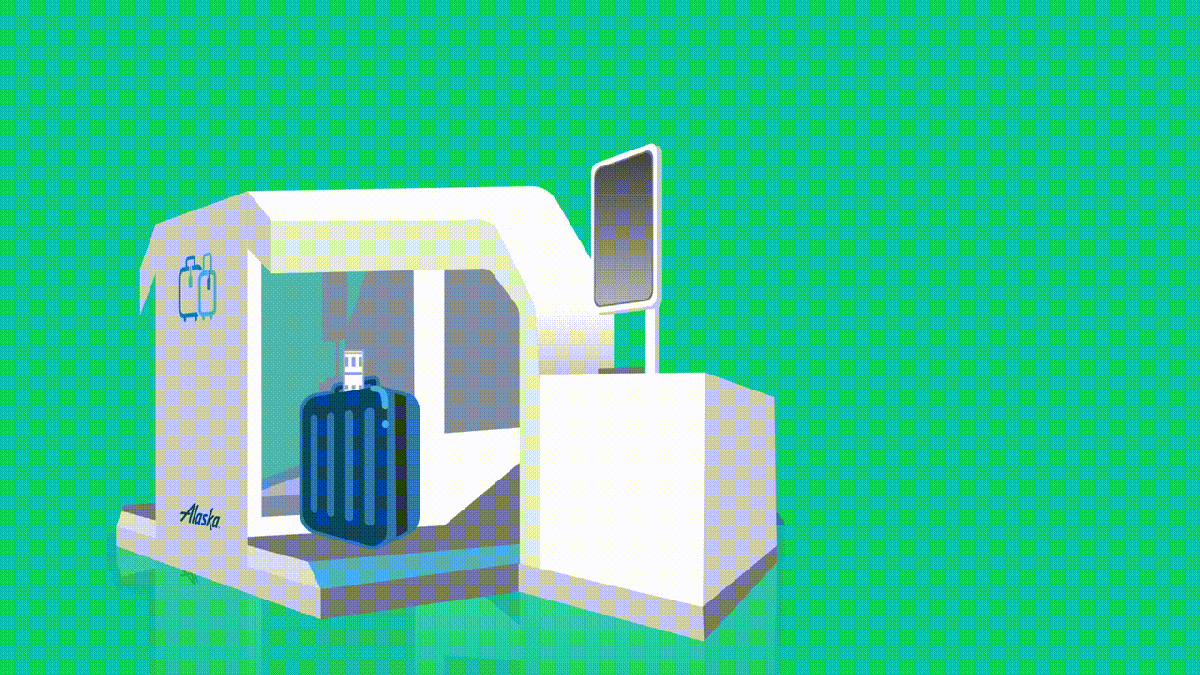
Alaska Airlines is flying forward into the future. Or, trying to do something like that at least. The company announced a suite of changes, soon to be coming to airport lobbies, in a Tuesday press release.
For one, Alaska Airlines has proclaimed there will be no more check-in kiosks. Instead, customers will have to check in prior to arriving at the airport on their phones, personal computers, or with a gate agent in person. iPads that print bag tags will supplant kiosks. This transition will be complete at most Alaska Airlines airport locations by the end of 2023. The change will probably result in a significant user surge of the company’s smartphone app, which is probably bad for customer privacy. But don’t worry—it gets much worse.
Advertisement
In a single line buried towards the bottom of the news statement, the airline noted that the bag-check process will eventually involve having your full face scanned. “Beginning in spring 2024, the lobbies in our hub airports will be getting innovative technology that will allow you to drop your bags off with just a few quick scans,” the release says. “The machine will scan your face, government-issued I.D., and bags,” the company further explains. And that’s it. That’s all of the explanation the press statement offers on the future facial scanners—except to note that these machines are already “popular in many international airports.”
A video embedded in the news release includes a brief animation demonstrating one of the scanners in action, as shown in the GIF above. A digital red line is pictured sweeping back and forth across a cartoon person’s face.
Advertisement
Advertisement
Gizmodo reached out to Alaska Airlines for more information on the facial scanners and the company’s policies but did not receive a response by publication time.
Facial scanning and biometric tech aren’t at all new to airports. Alaska Airlines is just the latest company to get in on the trend. But still, it’s a worrying continuation of the march towards eliminating all privacy in the name of “convenience,” which airports have been at the front lines of. There are few rules that limit where the biometric data collected at airports ends up. The facial scan data market is a largely unregulated wild west. Then, there are issues of cybersecurity, inaccuracy, and baked-in biases.
Advertisement
Last year, the Transportation Security Administration began testing face scanners at 16 different airports nationwide, as an alternative to having a human TSA agent match photo IDs with faces. And though TSA billed the in-testing tech as a means to improve security and speed, many privacy experts and tech analysts remain unconvinced. Facial recognition algorithms, used in this case to verify that ID photo scans correspond to IRL faces, can be racially biased and make mistakes.
In Atlanta’s Hartsfield-Jackson International Airport, face scans started appearing at baggage checks for multiple different international airlines back in 2018. Delta launched the same sort of tech at the Minneapolis-Saint Paul International Airport the year prior. A 2017 report assessing an earlier pilot of face scanners and facial recognition tech used to check for people overstaying visas in airports determined the technology was biased, had a high error rate, and was a threat to privacy.
Advertisement
Airlines release a lot of customer data willingly and knowingly to third parties. Alaska Airlines’ privacy policy, like that of many of its peers, is broad. In a summary, the company says, “we use and disclose personal data to provide and improve travel and other services, to communicate with you (including through marketing), to protect our company and others, [and] to comply with law.” To translate: the company shares your data with other companies (for profit or for other reasons) and offers it to law enforcement.
Though, Alaska Airlines notes that biometric data is considered “sensitive” and treated differently. “With your consent, Alaska will only use biometrics information on your day of travel for the purposes you consented to…Alaska does not store your biometrics nor use biometric information for any other purposes.” But there are exceptions to this. Biometric data used to access the Alaska Lounge at the airport, for instance, will stay stored on your personal device—it doesn’t automatically disappear.
Advertisement
Then, there’s the issue that airlines and airports are hacked all the time (Alaska experienced a security breach in 2016). The more customer data these companies have, the more information can end up in the hands of malicious actors.
U.S. citizens maintain the right to opt-out of the TSA facial scans. Alaska Airlines customers, too, can choose to forgo the biometric bag check (“If you do not wish to have your biometric information collected for this purpose, you can speak to a Customer Service Agent to obtain a bag tag”). But it’s getting harder and harder to do so, as the tech is incorporated into ever more layers of the travel process—from baggage check to security lines to airport lounges to boarding.
Advertisement
Telling an airline or TSA agent that you’d rather not submit to biometric testing will probably add some minutes to your travel time. In many cases, you’ll likely have to go through the same song and dance over and over again. It’s difficult to imagine most people prioritizing their privacy over the siren song of quick, seamless air travel, which is just what Alaska and others seem to be banking on.
Services Marketplace – Listings, Bookings & Reviews